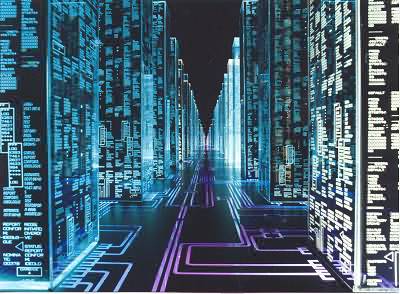So Lehman Brothers has declared Chapter 11 bankruptcy with $639 billion in assets.
Just to put that number in context, if a dollar was the size of a hailstone that was the size of a grapefruit that was the size of a football field, it would take 639 BILLION football fields to fit that many dollars.




T.S. Eliot promoted the idea of the literary canon. The concept that there were works that should be read by an educated individual to create a standard template, and in order to claim the rank of "educated". Some of the more esoteric aspects of the canon theory implied the idea that works (in true Elaine Benis assurance) were either "canon-worthy" or not, even as they were being written. While I never believed that canon theory needed to be extended to ridiculous levels. There still seems to be a certain belief that literature contains a bunch of "must-reads", just as film contains its "must-sees" and music contains its "must-hears". And while I suppose the canon can be applied to just about subject where so-called expertise can be expressed, I'm starting to wonder if the concept (as it pertains to the leviathan-like stature of the worldwide web) should be cannonballed out of existence.
Is there a canon of websites? Places that anyone who considers themself a web afficionado must visit on a regular basis to be considered "webjucated"? Must my web travelling habits include occasional visits to The Onion, Rotten Tomatoes, You Tube, Wikipedia? Do I lose any web geek cred without regular trips to io9, Ars Technica, Cnet, Engadget, Lifehacker, 1up, Slashdot, Sourceforge, TechCrunch or Digg?
Is there any piece of the web that has outlasted the transitory nature of the medium? Novels, short stories and poetry and rather constant. I haven't yet seen a story on Digg concerning a press release for Finnegan's Wake 2.0 or rumors that Prufrock is finally coming out of beta. Is there a website that contains content that is always enjoyable to go back to and remains unchanged? Many people have the ability to devote hours, days and weeks to re-reading novels on repeated occasions and enjoy them in unique ways each time. Does a website contain this same quality? I'll admit, that even years later, I can return to some of the early homestarrunner and Strongbad shorts and laugh as much as ever at Fluffy Puff Marshmallows and Trogdor the Burninator, but, other than content created as sheer entertainment, it's hard for me to think of an non-updated site that I will go back to over and over. And even with this, I would argue we are increasingly engrossed in the web than any single novel in spite of its transitory and unfinished quality.
While I would not say that, with regards to the web, the dissolution of the canon concept is tragic, there is an aspect to a wide-ranging common experience that I see becoming lost. The blog has made it easy for anyone to publish. I wish I could say "even though most shouldn't", yet that wouldn't only be antithetical to my populist belief in the medium, but the nature of the medium itself. Where Eliot's canon came from a few hundred years of white male Euro-centric writers, the demographics of web creators have blown that parameter wide open. And with this acknowledgement I pose two questions: will we ever have another William Shakespeare? Does anyone care?
If Bill was competing with hundreds of millions of playwrights instead of a relative handful, would his work have shone through the rest or would it have drown in a sea of obscurity? Does the web, as a medium, have the ability to create a wordsmith superstar or a "canon-worthy" podcaster? While I love the web's diversity, I am often frustrated by it's magnitude. While I clamour for the fresh and new, I still find myself with an inexhaustible list of bookmarks.
It seems the "suggestion" phenomenon is the latest attempt at a solution to navigate through the ocean. By data and trend and mathematic formula StumbleUpon wants to suggest what sites I might like, Digg wants to tell me what everyone else thinks is cool, the Internet Movie Database wants to aggregate films by previous users preferences and Apple's Genuis wants to emulate Pandora's ability to recommend not only what music I may like, but how my existing music should be organized. While the power of suggestion can be a great tool in sifting the through the dreck, it does have an insidious limitation: how is one supposed to be shocked anymore? Can I find a song that blows my mind through suggestions of music I'm already used to? Will I pick up a film that offends my senses but makes me see the world in a new way if the suggestions come from what I'm already comfortable with? And how does one find the truly inventive on the web when the recommendations come from a social demographic that, while admittedly more diverse than Eliot's "educated" society, has become relatively narrow in its own focus. Bloggers of a feather flock together. I love that we are canon-free but mourn the loss of greatness found.

Worth1000.com offers up an archive of mashed up advertising images that describe what products are really like.
A Russian judge has declared that, for the survival of the species, it's legal for male bosses to sexually harass female employees!
Yakov Shmirnoff's rolling over in his grave... oh, he's not dead? His career sure is! BAH-ZZING!
Maybe that means it's now okay to give Mother Russia a Mother Goose... Huh? Huh? Nothing? It's like Lenin's tomb in here.

Ethnologue.com's bold tagline claims that it catalogues 6912 of the world's living languages. While the claim is surely impressive, it makes one wonder at the freak happenstances of history that have allowed us to become so messed up as a species that we couldn't unify some of our communication. Even body language is radically different between adjacent regions.
Let's face it, if there remain 7000 different interpretations of words as common as "water", we are always going to have destructive global conflicts around the world. I know this sounds like quite a leap, but when a mesh-backed cap wearer in Mississippi will turn around and crack someone over the skull with a beer bottle because he misheard someone complimenting him as a "flag lover", the variations of language have proven their destructive powers. In the meantime I'm going to enjoy a tall cool glass of wasser, agua, uma, su, wossa, ondou, ji, akvo, banyu or H2O.While the Esperanto experience was noble in its conception, and small groups have adopted the constructed language to varying degrees, it certainly was never the over-riding success that would change the face of world communication. That said, technology has radically changed the ability to communicate across borders, continents and oceans. While trying to propagate a language through print would be cumbersome at best, involving drawn out exchanges by letter on usage, failures and successes, the current state of connectivity allows for everything from a text file dictionary e-mail attachment to live video-on-demand tutorials. There are, however, problems that would tax any attempt to resurrect Esperanto or some other existing or constructed language.
The sociological impact of a newly-learned language distributed throughout humanity sounds tempting, but consider the risk. As knowledge is power, so is language. While certain countries may endorse, adopt, perhaps even legislate the language's education to its populace, those falling behind would not only put themselves at a disadvantage with regard to simple understanding but, moreso, on the precipice of an economic sinkhole. Clear language is essential in business and is the reason so many MBA sycophants pick up Japanese or Chinese as a second language; there's always a job for someone that can bridge the verbal and written gap between world languages.Those who, for any reason, could not maintain the pace of the language's growth would start to suffer implicit economic sanctions as trade would become scarce. Third world countries would hardly stand a chance as the technology that would allow for ease of assimilation is beyond them.
I suppose that half of the problem could be alleviated by eliminating the written language altogether. If books become e-books, letters remain e-mail, and business can be validated digitally, does an a/v language become the standard of correspondence? I'd wager that ascii emoticons reach cross-culturally far more effectively than the words "smile" or "wink". Will broadband lead the way for the constructed language of the future? Maybe the tight head shot of a webcam will prompt a serious re-examination of strictly face language instead of body language. A new business crops up of web notaries that will witness and certify verbal contracts completed via Skype. All chat, journalism, blogging, becomes aural or visual. All poetry, short stories and novels become spoken word recordings. The death of the written word - as Sanskrit became increasingly divorced from a verbal component, the new "Visaural" language would evolve without a written component.I know it sounds far-fetched, but could we at least start with proper names? I think we need to evolve to the point where we can respect the language of the place that spawned the name of the place. Would it really be that difficult for us to pronounce Rome as Roma or Paris as "Pa-ree"? Couldn't we say Espana for Spain or Deutschland for Germany? It really wouldn't be that hard, because while I honestly don't see a way to avoid history's diverse explosion of languages, I really hate it.

Sitting in the lobby of the Sheraton Hotel and Convention Centre in Richmond Hill, Ontario for four days of conference and training, I awoke at 4am and could not get back to sleep even after listening to a full CD's worth of 80's progressive rock and begrudgingly watching some Olympic coverage because my only other choice was an infomercial about an exercise machine that doesn't look nearly as fun as some of the well-toned automatons seem to indicate.
Normally, at such events, I'm loathe to be startled by a wake-up call that rattles through my skull like the demented cross between the bells of St. Mary's and a Nine Inch Nails B-side. On this morning at least, I was not subjected to such an ordeal.
Being lucky enough to have found employment in a career that affords me a long summer vacation (and being a nighthawk by nature) I usually find myself, by the second week of July, waking no earlier than the crack of noon and often getting to sleep after dawn's break. While this morning, as I occasionally glance up past the horizon that is the top of the monitor at the early-risers in their caffeine-induced wanderlust, I am content to live with novelty of having become conscious at a time where, for the past six weeks, I had often remained up to see. In the summer I'm wont to ask friends, "you mean there's a 10am?"
Morning is just wrong in so many ways.
I drift around in a semi-conscious haze and am annoyed by people that are way too happy and energetic for their own good. I would much rather see the stragglers from an all-night run at a club come staggering through the lobby - at least they look how I feel. They've done their best to try and make me comfortable in the Hilton lobby. They've provided me with a complimentary PC to bang away my thoughts (although using IE6 again is a painful experience). They've gone through great pains to create this crazy open feng shui environment that runs an unbroken stretch incorporating the front desk, TV lounge, internet stations, bar, coffee shop and restaurant. But for the restaurant it kind of looks like an upscale Barnes & Noble. I feel so damn cosmopolitan I might just throw up. If I see one more light fixture that looks like it belongs at the MOMA or one piece of smoked glass I may just need a bucket.
If you awake early in the mornings while travelling, it can never be a good thing. It usually means you have stuff you HAVE to do (and nobody wants to HAVE to do anything), or you evidently didn't try hard enough to have fun the night before.
And as the TV in the lounge shows sports highlights and the overhead cascade of piped-in music plays Aerosmith's "Dream On" (and oh, I so wish I could have dreamed on from 4-8am) , and a Peewee baseball team from Whoknowswheresville tramps in to kill time in front of the TV until they're allowed to check in (it's 7:30 am!), and I frame my vision with a print of a elephant with the title "Kenya" behind the coffee stand barrista, and the lamp beside my monitor screams to be reunited with its Ikea brethren, and most people are dressed WAY better than I am with my "I'm what Willis was talkin' 'bout" tee, I take some solace in looking at the gentleman two PCs over, who, by his body language, seems to get it.


